PRINCETON, NJ -- Twenty-nine percent of black Americans name Barack Obama as the individual or leader in the United States whom they would choose as their spokesman for race issues, but 49% name someone else and nearly a quarter produce no name.
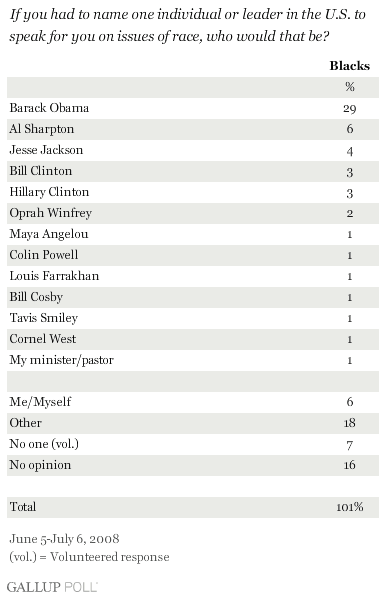
The issue came up last week over controversial remarks the Rev. Jesse Jackson made about Obama. Jackson criticized Obama's campaign messages of personal responsibility for blacks as "talking down to black people." Jackson claimed that Obama has not adequately emphasized the need for the government to take more responsibility and action to help blacks.
The poll, conducted before the Jackson controversy erupted, finds that Obama is clearly the most dominant individual blacks think of in terms of representing their views on racial matters. He far outpaces the Rev. Al Sharpton, mentioned by 6%; Jackson (with 4%); Bill and Hillary Clinton, each with 3%; and an array of academic, political, and entertainment icons of the black community. However, consistent with Obama's efforts to downplay the racial symbolism of his candidacy, most blacks don't think of Obama as their racial spokesman. A total of 49% cite someone else (including 6% who name themselves).
These results are from Gallup's annual Minority Rights and Relations survey, conducted each June. The 2008 survey consists of nationally representative interviews with 1,935 adults, including more than 700 non-Hispanic whites, more than 600 blacks, and more than 500 Hispanics, all weighted to represent their correct proportions in the population.
This is not to say that black Democrats are not excited about Obama's candidacy or that they don't hold out high hopes for what an Obama victory could achieve for black Americans. A remarkable 90% of black Democrats -- compared with 64% of non-Hispanic white Democrats and 36% of all Republicans -- say they are "more enthusiastic" about voting than usual this year.
Additionally, the Minority Rights and Relations survey shows that a 59% majority of blacks say they would view Obama's winning the presidency as one of the most important advances of the past century for blacks. This contrasts with a slightly smaller 48% of non-Hispanic white Americans who view the prospect of putting the first black American in the White House as a key civil rights milestone.
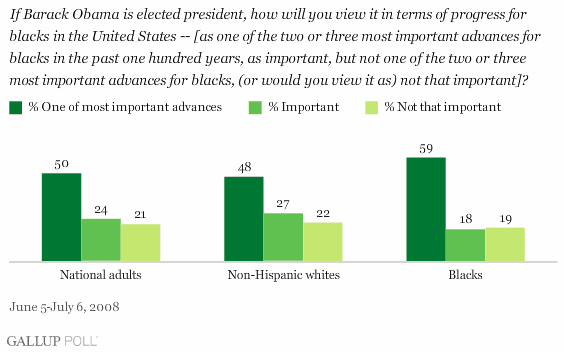
An overwhelming majority of whites (73%) and blacks (85%) believe an Obama win would be a sign of progress toward racial equality in the United States. Most whites and blacks also believe it would open up national political opportunities for other blacks, and majorities think it would make it easier for blacks to advance their own careers.
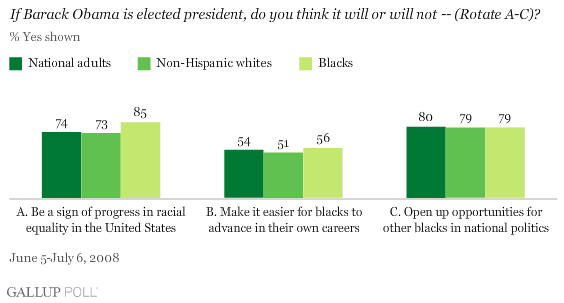
Now that Obama has become the first African-American to be a major party's presumptive nominee for president, one might ask how black America will react if he doesn't win. Only a third of blacks (34%) predict that race relations in the country would worsen (either a little or a lot) if Obama loses. While only 18% say relations would improve, the plurality, 45%, say they would not change. Whites generally agree, with a slim majority saying race relations will not change if Obama loses, but with more saying they will get worse than get better.
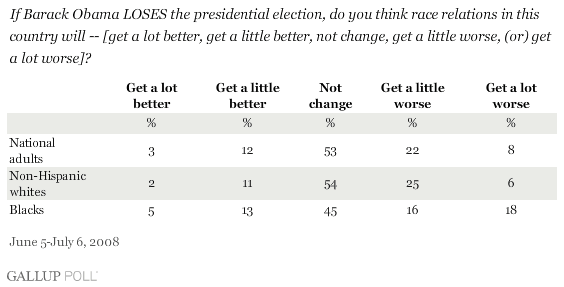
At the same time, blacks have muted expectations for how much an Obama win would improve race relations. Although the vast majority of blacks think it would improve race relations to some degree, only 23% say race relations would "get a lot better."
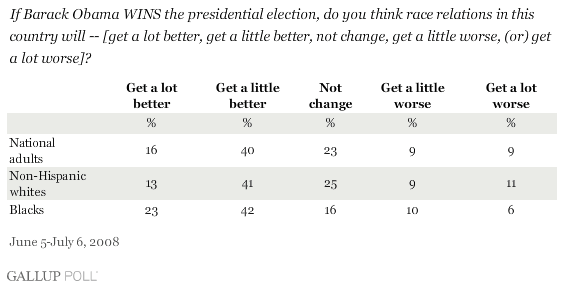
Bottom Line
Twenty-nine percent of blacks name Obama as the individual or leader in the United States whom they would choose as their spokesman for race issues, far more than name any other individual, including the 4% who mention Jackson. This suggests a passing of the baton for the political leadership of black Americans, which some have suggested may be what is troubling Jackson.
In discussing Jackson's controversial remarks about Obama recently, Sharpton said, "Sen. Obama is running for president of all Americans, not just African-Americans." To the extent that's true, it is not curtailing black Americans' willingness to support Obama for president. According to Gallup Poll Daily tracking in the first week of July, 90% of black registered voters say they are voting for him, compared with only 4% backing McCain. And, as noted, blacks are almost universally enthusiastic about the election.
However, the poll does suggest that black Americans see beyond race when thinking about Obama. By not heavily associating Obama with the "black spokesman" role (49% name someone else and nearly a quarter name no one), and by holding somewhat muted expectations for his ability to improve race relations, blacks seem to agree with the essence of Sharpton's commentary: Obama is more than "the black candidate for president"; he's a candidate for president who happens to be black.
Survey Methods
Results are based on telephone interviews with 1,935 national adults, aged 18 and older, conducted June 5-July 6, 2008, including oversamples of blacks and Hispanics that are weighted to reflect their proportions in the general population. For results based on the total sample of national adults, one can say with 95% confidence that the maximum margin of sampling error is ±4 percentage points.
For results based on sample of 702 non-Hispanic whites, the maximum margin of sampling error is ±5 percentage points.
For results based on sample of 608 non-Hispanic blacks, the maximum margin of sampling error is ±5 percentage points.
For results based on sample of 502 Hispanics, the maximum margin of sampling error is ±6 percentage points (120 out of the 502 interviews with Hispanics were conducted in Spanish).
Interviews are conducted with respondents on land-line telephones (for respondents with a land-line telephone) and cellular phones (for respondents who are cell-phone only).
In addition to sampling error, question wording and practical difficulties in conducting surveys can introduce error or bias into the findings of public opinion polls.
To provide feedback or suggestions about how to improve Gallup.com, please e-mail feedback@gallup.com.
